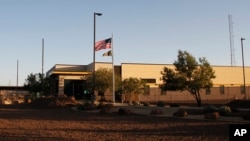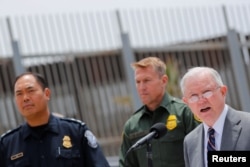Several hundred children, held in a U.S. border detention facility in Texas after entering the country without authorization, will be sheltered elsewhere, following a media report last week that described unsanitary living conditions and inadequate food and medical treatment at the facility.
The Associated Press reported Monday that authorities moved “more than 300 children" out of a Border Patrol station in Clint, Texas, following a June 20 story by the news agency.
Lawyers who visited the remote station said that older children were caring for other children, sanitation conditions were substandard, and children were sick, living in soiled clothes and being given rotten food, according to the AP.
VOA requested comment from the two government agencies involved in housing children who cross the border without authorization, or without a guardian -- U.S. Customs and Border Protection and the Office of Refugee Resettlement, within the Department of Health and Human Services. Neither office responded as of Monday afternoon.
A June report by the Office of the Inspector General, the internal watchdog at the U.S. Department of Homeland Security, found cleanliness and sanitation problems during an inspection of four detention facilities.
Asked about the allegations of poor standards for detained children, U.S. President Donald Trump did not address the AP report in a TV interview aired on Sunday on NBC’s “Meet the Press” show. Instead, he laid responsibility -- erroneously -- on his predecessor, President Barack Obama, for the creation of what became known under Trump as the "family separation" policy.
As researchers from the Bipartisan Policy Center explained in a 2018 report, previous administrations relied more heavily on family detention facilities or alternatives to detention, like the use of monitoring devices.
Parents and children were separated under Obama in limited circumstances, such as cases where child trafficking was suspected.
It was under the Trump administration, however, that then-Attorney General Jeff Session announced a blanket zero tolerance policy to detain all migrants who crossed the border without authorization.
That policy, though short-lived, led to thousands of adults and children being held in separate facilities. The public backlash and lawsuits led the administration to rescind the policy.
In a separate interview Sunday, U.S. Vice President Mike Pence acknowledged that the conditions in the facilities as reported by AP were unacceptable, he shifted the blame to Democrats in Congress.
Meanwhile, authorities said Monday that three children and one adult found dead in South Texas near the border with Mexico probably died of dehydration and heat exposure after crossing the Rio Grande into this country, AP reported.
An increase in the detention of families with young children and children traveling without guardians has left U.S.officials scrambling to meet the shelter demands on the border.
At one point in recent months, CBP solicited bids to purchase thousands of baby bottles and diapers for detainees at the border.
From Oct. 1, 2018 - the start of the fiscal year - through May 31, CBP has detained 332,981 families and 56,278 unaccompanied children at the border, according to agency data.
The agency is under scrutiny over several deaths of children in its custody since late last year.





